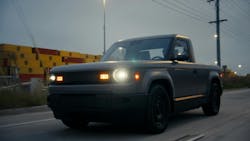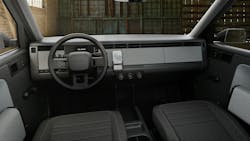Slate's Minimalist Electric Pickup: A Throwback to Affordable Vehicles
Automotive industry watchers have been sounding the alarm for more than a decade – vehicles have gotten too expensive, making new cars and trucks something that average buyers have to finance over seven years. Since COVID-19 supply chain problems, the issue has gotten much, much worse, Consumer Price Index data show.
Whatever happened to cheap cars and trucks with crank windows, knobs for the air conditioner instead of touchscreens and plain, non-luxurious, functional interiors? You know, the kind of car that costs less than $10,000 in the early 2000s (the 2006 Nissan Versa was the last car in the U.S. to start that low).
Slate, a startup car company in Troy, Michigan, backed by Amazon Founder Jeff Bezos and others, thinks it can fill that niche for a cheap vehicle. Its electric pickup, due out at some undisclosed time in the not-too-distant future, is a throwback in many ways, despite its electric powertrain.
Hand-cranked windows. No sound system. Two seats. One color (gray). No touchscreen. A tiny size, more in line with the compact pickups of the 1980s (Ford’s compact Maverick pickup is about two feet longer). Even its electrical system is minimalist with a 150-mile range.
The results are a vehicle that should cost less than $20,000 after tax credits, assuming those survive the current climate in Washington. Even without the credits, Slate is slated to be one of the cheapest vehicles available in America when it launches… soonish?
“The definition of what’s affordable is broken,” Slate CEO Chris Barman said. “Slate exists to put the power back in the hands of customers who have been ignored by the auto industry.”
Part of the Slate philosophy is to not install on the car what customers can bring themselves. Instead of installing the complex wiring and equipment needed for a sound system, it comes with a universal cell-phone mount for the dashboard, and users can put wireless Bluetooth speakers in the glove compartment.
Rather than offering lots of color choices for the plastic body panels (like General Motors’ former Saturn division’s vehicles), Slate plans to offer vinyl wrap kits for about $500 that owners can install themselves, allowing for frequent exterior changes.
Want a 5-seat SUV instead of a 2-seat pickup? It’ll offer a kit for that, making the Slate about the same size as a 2-door Jeep Wrangler.
Think that 150-mile range is too short? A larger add-on battery will be available to boost the range to about 240 miles.
The personalize-everything approach itself is a bit of a throwback to the former Toyota FJ Cruiser, a vehicle that was break-even for the manufacturer in its base form, but endlessly customizable with dealer-installed accessories the made it highly profitable for Toyota.
From a manufacturing perspective, having one model with no options eliminates massive amounts of complexity found at most pickup plants. At Ford’s Kentucky Truck Plant in Louisville, for example, workers make four different Super Duty Truck models, each available with three cab sizes, three bed lengths, two suspension types, four engine options, five trim packages and multiple color options.
The company says the minimalist truck will come out of a factory in the Midwest but has not yet offered details. There are several former auto plants that have become contract-manufacturing hubs, such as the former GM plant in Lordstown, Ohio, that are taking contracts to produce electric vehicles for startups.
Batteries for the vehicles will come from Korea's SK On, a company that has two joint-venture battery plants with Ford in the U.S. and one of its own in Georgia, making hybrid and EV batteries for a handful of different automakers.
About the Author
Robert Schoenberger
Editor-in-Chief
LinkedIn: linkedin.com/in/robert-schoenberger-4326b810
Bio: Robert Schoenberger has been writing about manufacturing technology in one form or another since the late 1990s. He began his career in newspapers in South Texas and has worked for The Clarion-Ledger in Jackson, Mississippi; The Courier-Journal in Louisville, Kentucky; and The Plain Dealer in Cleveland where he spent more than six years as the automotive reporter. In 2014, he launched Today's Motor Vehicles (now EV Manufacturing & Design), a magazine focusing on design and manufacturing topics within the automotive and commercial truck worlds. He joined IndustryWeek in late 2021.



